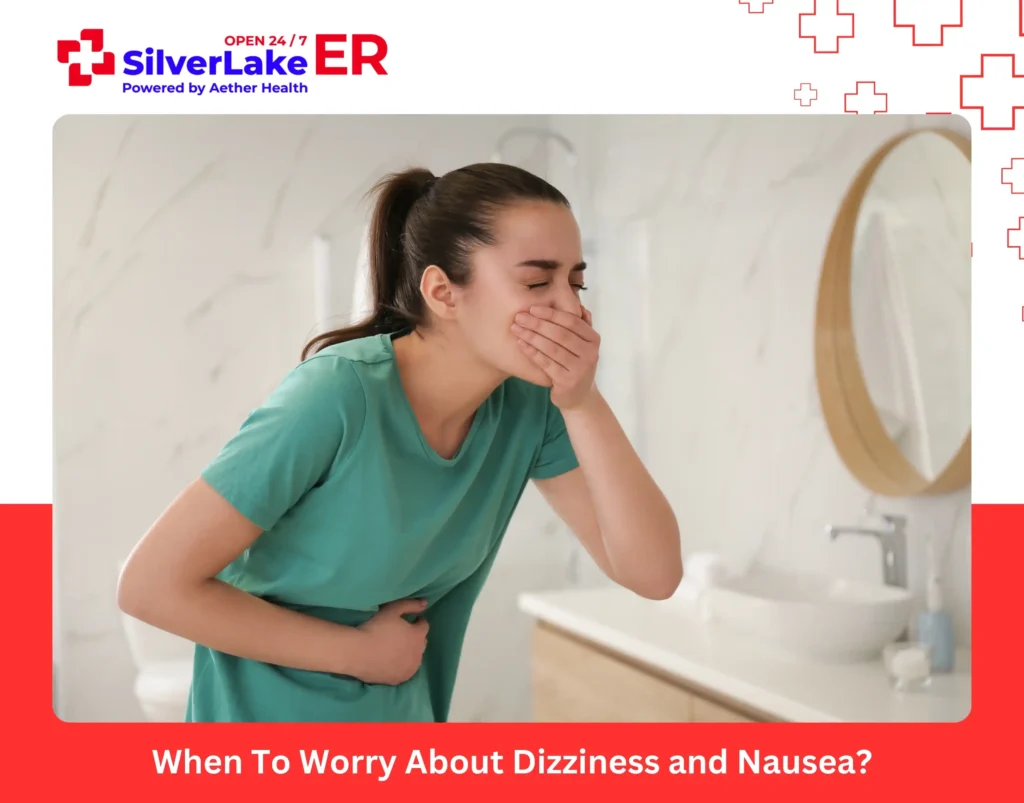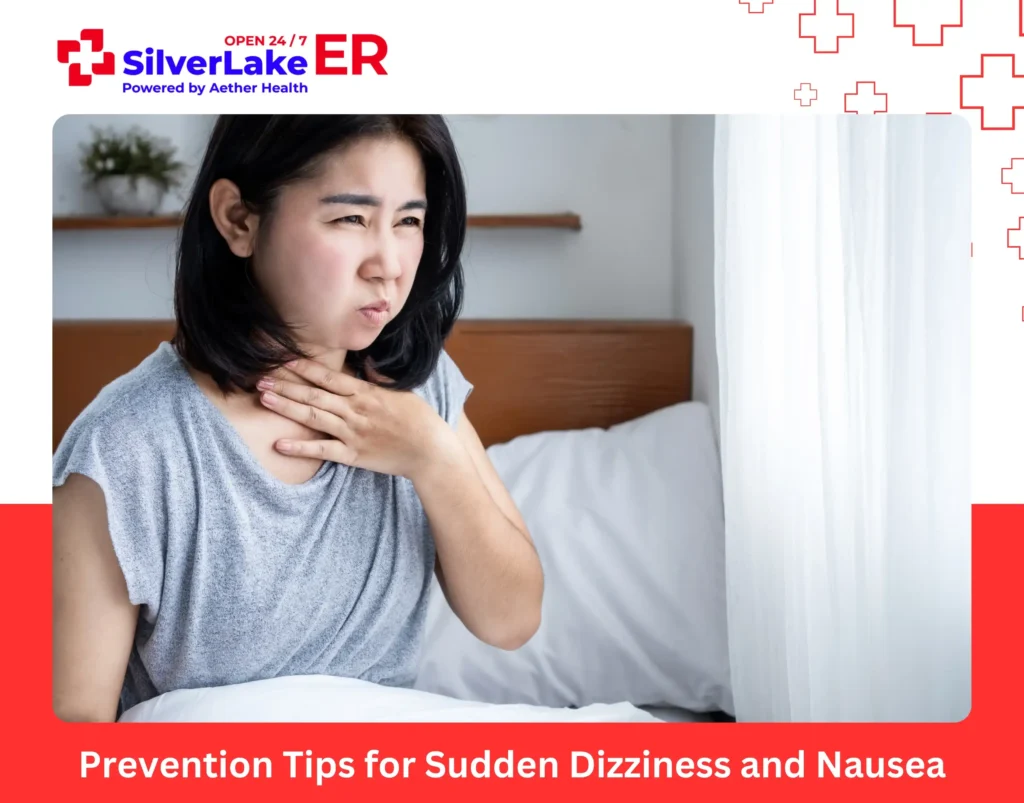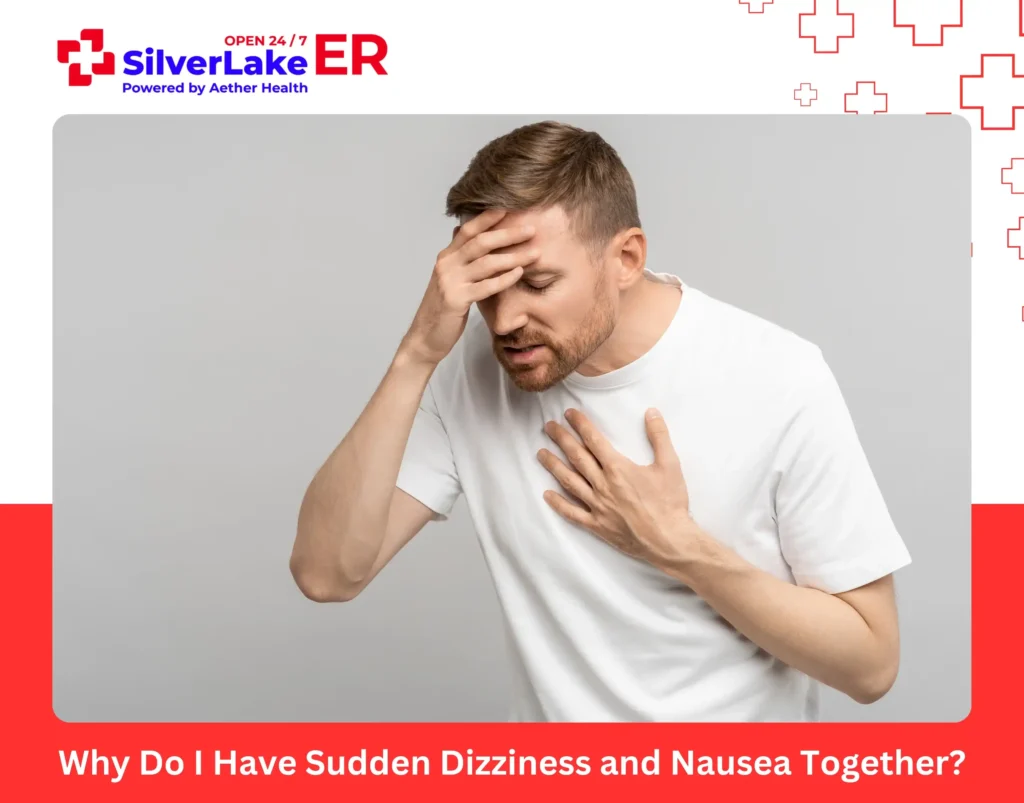Do you know that these two separate problems, dizziness and nausea, often point to a single underlying issue? And the issue can range from something minor like dehydration or anxiety, to something severe like a heart problem or stroke.
If you know the reason behind your vertigo symptoms and nausea, you’ll know when to try simple recovery tips and when to seek professional care. This way, you can avoid serious complications, unexpected medical bills, and a prolonged recovery.
Let’s explore what causes sudden dizziness and nausea, the red flags that require emergency care, and some helpful strategies for prevention and treatment.
What’s Happening When You Feel Dizzy and Nauseated?

Dizziness and nausea often go hand-in-hand because of how your inner ear, brain, and digestive system are wired. The inner ear helps with balance. Your brain processes that information and coordinates it with visual input.
If something throws that balance off, your brain gets confused. And when your brain is confused, your stomach may respond with nausea.
7 Common Causes of Sudden Dizziness and Nausea
Let’s explore the most frequent culprits behind this unpleasant combination:
1. Benign Paroxysmal Positional Vertigo (BPPV)
BPPV is one of the most common and treatable causes of sudden dizziness and nausea. It occurs when tiny calcium crystals in the inner ear become dislodged and disrupt the balance system. When you move your head, these crystals shift and confuse the brain’s perception of motion, resulting in brief episodes of vertigo and nausea.
Symptoms typically last under a minute and are triggered by rolling over in bed, tilting your head back, or bending down. With proper diagnosis, techniques like the Epley maneuver can offer immediate relief.
2. Vestibular Migraine
Vestibular migraines are a neurological condition in which dizziness, vertigo, and nausea are the primary symptoms (often without a traditional headache). These episodes can be triggered by stress, lack of sleep, hormonal changes, or certain foods.
Some people also experience light and sound sensitivity, visual disturbances, or unsteadiness. These symptoms may last from minutes to days. A clinical diagnosis followed by lifestyle changes, dietary adjustments, and preventive medications can help reduce their frequency.
3. Inner Ear Infections (Labyrinthitis or Vestibular Neuritis)
When the inner ear becomes inflamed due to a viral or bacterial infection, it can result in sudden, intense dizziness and nausea.
- Vestibular Neuritis. The vestibular nerve (responsible for balance) gets inflamed, usually due to a viral infection. Hearing is usually not affected.
- The entire inner ear (the labyrinth) becomes inflamed, usually from a virus or, less commonly, bacteria. Labyrinthitis affects both your balance and hearing. It causes vertigo, nausea, ear ringing (tinnitus), and hearing loss in one ear.
Both conditions can follow a cold or respiratory illness and may cause symptoms that persist for days. Prompt medical care, including anti-inflammatory or antiviral medications, can help shorten the course and prevent complications.
4. Motion Sickness
Motion sickness arises when the brain receives mismatched signals from the eyes, ears, and body. Common in travel situations, cars, boats, planes, or amusement rides, this conflict can lead to dizziness, sweating nausea, and vomiting. Virtual reality environments can induce motion sickness in some individuals.
Prevention strategies include focusing on a fixed point, keeping the head still, using acupressure wristbands, taking antihistamines, and trying natural remedies like ginger.
5. Low Blood Pressure or Dehydration
A sudden drop in blood pressure (orthostatic hypotension) or significant dehydration can limit blood flow to the brain, resulting in sudden dizziness and nausea, or fainting. These symptoms can arise from heat exhaustion, vomiting, diarrhea, or prolonged physical exertion without adequate hydration.
Quick rehydration, lying flat with legs elevated, and avoiding sudden postural changes can bring rapid relief.
6. Anxiety or Panic Attacks
Stress and anxiety can cause a surge of adrenaline, triggering dizziness, nausea, chest tightness, shortness of breath, and fear of losing control. These symptoms are real and distressing, even in the absence of a physical disorder.
Mindfulness, breathing exercises, therapy, and, in some cases, medications can significantly reduce the frequency and intensity.
7. Stroke or Transient Ischemic Attack (TIA)
Though rare, sudden dizziness and nausea can be early signs of a stroke or TIA. These events involve a disruption in blood supply to the brain and may occur alongside weakness, facial drooping, trouble speaking, vision changes, or coordination problems.
A TIA, often called a “mini-stroke,” is a warning sign of future stroke risk and should never be ignored.
When To Worry About Dizziness and Nausea?

Seek emergency medical care if sudden dizziness and nausea are accompanied by any of the following symptoms:
- Sudden, severe headache
- Chest pain or irregular heartbeat
- Difficulty speaking or slurred speech
- Weakness or numbness on one side of the body
- Loss of coordination or inability to walk
- Fainting or blacking out
- Double vision, blurred vision, or eye movement problems
These may point to life-threatening conditions such as stroke, heart attack, or serious neurological disorders.
Diagnostic Process
Diagnosing the cause of sudden dizziness and nausea involves multiple steps:
- Medical history: Includes recent illnesses, medications, and symptom triggers
- Physical exam: Focuses on balance, coordination, hearing, and eye movements
- Hearing and balance tests: Help identify BPPV or inner ear dysfunction
- Blood tests: Evaluate for dehydration, infection, or metabolic issues
- Imaging tests (MRI/CT): Rule out stroke, tumors, or other brain abnormalities
- ECG or heart monitoring: Detects cardiac rhythm problems
- Tilt table testing: Assesses blood pressure responses to position changes
Treatment Options
Treatment of sudden dizziness and nausea depends on the underlying cause:
- BPPV: Repositioning maneuvers (e.g., Epley) and vestibular rehabilitation
- Vestibular Migraine: Trigger avoidance, preventive medications, and stress management
- Inner Ear Infections: Medications for infection, anti-nausea drugs, and balance therapy
- Motion Sickness: Antihistamines, ginger, acupressure, and travel planning tips
- Anxiety: Psychotherapy, mindfulness, medication, and lifestyle modifications
- Dehydration/Low Blood Pressure: Hydration, electrolyte correction, and pressure-supporting meds
- Stroke/TIA: Emergency intervention, clot-busting drugs, and long-term prevention strategies
Prevention Tips for Sudden Dizziness and Nausea

To reduce the chance of future episodes:
- Stay hydrated, especially in hot weather or during illness
- Avoid sudden movements when rising or turning your head
- Get adequate sleep and manage stress
- Identify and avoid triggers like caffeine, alcohol, or certain foods
- Exercise regularly to improve balance and circulation
- Monitor chronic conditions and take medications as prescribed
Final Thoughts
Sudden dizziness and nausea can stem from various causes, including BPPV, inner ear infections, dehydration, motion sickness, anxiety, and more. Paying attention to accompanying symptoms and the context in which these sensations arise is key to determining their seriousness.
If you feel unsure, trust your gut. It’s always better to get checked out than to wait and risk something serious. At ER Dallas, we’re here 24/7 to help you figure it out fast. Whether it’s vertigo, dehydration, or something more urgent, our team can give you the tests, care, and peace of mind without long waits.
FAQs
1. Can COVID-19 or other viral infections cause dizziness and nausea?
Yes. Dizziness and nausea can be symptoms of COVID-19 or part of a post-viral syndrome. If these symptoms occur with fever, fatigue, or respiratory issues, testing is recommended.
2. Are these symptoms dangerous if they happen occasionally?
If infrequent and mild, they may not be a cause for concern. However, frequent, severe, or sudden episodes warrant medical evaluation.
3. Can dehydration alone cause sudden dizziness and nausea?
Yes. Dehydration can lower blood pressure and reduce oxygen to the brain, causing dizziness, lightheadedness, and nausea.
4. Do inner ear problems always cause hearing loss?
Not always. Vestibular neuritis may cause dizziness without hearing symptoms, while labyrinthitis often includes hearing loss and tinnitus.
5. Should I be worried about a stroke every time I feel dizzy?
Not necessarily. Most cases are benign. However, if dizziness occurs with other stroke warning signs, seek Emergency Care immediately.




